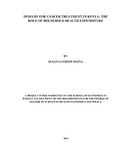| dc.description.abstract | Poor health imposes a heavy burden on society and slows down economic growth.
Illness in the family is one of the major causes of the reduction of incomes and assets of
poor Kenyans. Cancer has had a demonstrated negative impact on households, their
education, as well as in their workforce productivity.
The study was designed to investigate the factors that influence a cancer patient’s choice
of a health care facility in Kenya. The study used the Household Health Expenditure and
Utilization Survey HHEUS (2013) published by the Ministry of Health (MoH) and
facilitated by the Kenya National Bureau of Statistics (KNBS). The Kenya Household
Health Expenditure Utilization Survey (KHHEUS) 2013 data had an original sample of
29,200. Only data for patients whose illnesses were cancer and terminal was retained for
analysis. This procedure shrunk the sample size to a subsample of 3,896 respondents.
The data was analyzed using Stata statistical software using descriptive, causal and
inferential statistics. A multinomial logistic (M-logit) regression model was estimated. A
Log-Likelihood Chi-square statistic and a pseudo R-squared were established alongside
marginal effects of predictors on the probability of choice of competing health facilities.
Among the study findings are that rural dwellers have higher uptake of cancer healthcare
services from public, mission and traditional health facilities than those of private and
NGO providers. Traditional facilities have the highest treatment cost whereas public
facilities have the lowest. Extremely few insured respondents with cancer and terminal
illnesses go for traditional healthcare. Individual social attributes found to be important in
influencing choice of healthcare for cancer and terminal illnesses were religion and
education. As a recommendation, the national and county governments, private investors,
NGOs and development partners should increase the range of alternative providers of
such services. | en_US |

